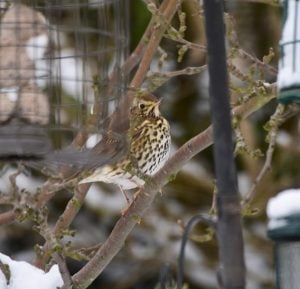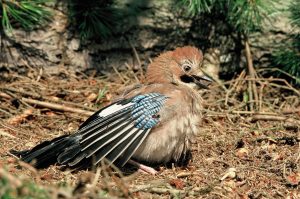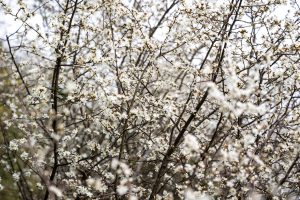Spring is on its way...honest!
It might not seem like it but Spring is on its way, and if you want to be accurate it’s already here. We entered into meteorological Spring on 1st March, but it just seems that someone forgot to mention it to our climate. Even if you work to the astronomical Spring start date of March 20th, it is still very late for such cold weather.
Although many will say that the cold snap(s) are more akin to what our winters used to be like, this is little consolation to the wildlife, and as a result of these periods of intense cold being so late, our wildlife has suffered. This is where we can all lend a hand. As you might expect this is in the form of plentiful supplies of food and water, and to ensure that the food is supplied via clean feeders too. Recent evidence from a study by the BTO and ZSL highlighted the importance of feeding wild birds and also trying to combat the spending of diseases as can be seen on the Garden Wildlife Health website.
But despite all of this, Spring is trying to do its thing! Just look around in your local area. Crocuses managed to flower in my area before the first visit from the Beast from the East, and although its visit resulted in many flowers being flattened by the snow, they provided a welcome splash of colour. Snowdrops, although a very early flowering plant, also managed to flower even through the harshest weather. And more recently people with ponds in their gardens are finding frog and toad spawn.
But it’s the birds that often suffer the mos, as most live a finely balanced existence regarding the amount of food they eat in relation to the energy they expend in finding it and keeping warm. Sadly I’ve seen a number of reports, and pictures, of birds that haven’t made it. But as sad as this might be, there have been some high points. Many gardens that wouldn’t have ordinarily seen rarities have had Redwings, Redpolls, Siskins and Fieldfares visit feeders.
What has become very obvious is the need for continued feeding, not just the occasional few bits dropped onto a bird table. Feeding in these conditions is a commitment as the birds will come to rely on your garden as a food source, but the rewards are very worthwhile. Although some of the recent visitors are migrants that overwinter here, they are none the less welcomed and who knows, you might just see them again next winter.
Until then, and with the clocks altering to British Summer Time, we can, at last, put these visits from this eastern beast behind us and look forward to warmer weather, longer daylight hours and the return of our summer visitors. And of course 2018’s fledglings.
Images & content © Phil Pickin
Although many will say that the cold snap(s) are more akin to what our winters used to be like, this is little consolation to the wildlife, and as a result of these periods of intense cold being so late, our wildlife has suffered. This is where we can all lend a hand. As you might expect this is in the form of plentiful supplies of food and water, and to ensure that the food is supplied via clean feeders too. Recent evidence from a study by the BTO and ZSL highlighted the importance of feeding wild birds and also trying to combat the spending of diseases as can be seen on the Garden Wildlife Health website.
But despite all of this, Spring is trying to do its thing! Just look around in your local area. Crocuses managed to flower in my area before the first visit from the Beast from the East, and although its visit resulted in many flowers being flattened by the snow, they provided a welcome splash of colour. Snowdrops, although a very early flowering plant, also managed to flower even through the harshest weather. And more recently people with ponds in their gardens are finding frog and toad spawn.
But it’s the birds that often suffer the mos, as most live a finely balanced existence regarding the amount of food they eat in relation to the energy they expend in finding it and keeping warm. Sadly I’ve seen a number of reports, and pictures, of birds that haven’t made it. But as sad as this might be, there have been some high points. Many gardens that wouldn’t have ordinarily seen rarities have had Redwings, Redpolls, Siskins and Fieldfares visit feeders.
What has become very obvious is the need for continued feeding, not just the occasional few bits dropped onto a bird table. Feeding in these conditions is a commitment as the birds will come to rely on your garden as a food source, but the rewards are very worthwhile. Although some of the recent visitors are migrants that overwinter here, they are none the less welcomed and who knows, you might just see them again next winter.
Until then, and with the clocks altering to British Summer Time, we can, at last, put these visits from this eastern beast behind us and look forward to warmer weather, longer daylight hours and the return of our summer visitors. And of course 2018’s fledglings.
Images & content © Phil Pickin



